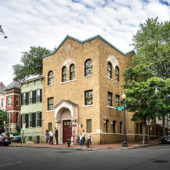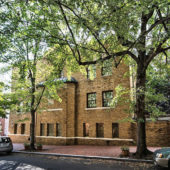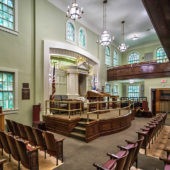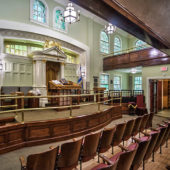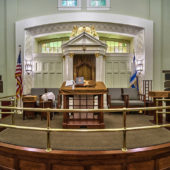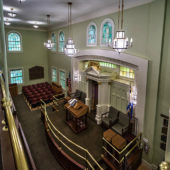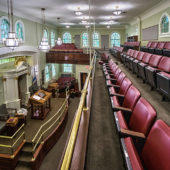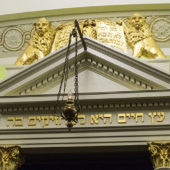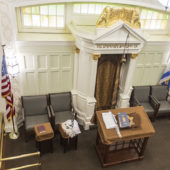The only Orthodox synagogue in downtown Washington, D.C. Only 14 blocks from the White House and 2 miles from the Capitol.
Kesher Israel, also known as the Georgetown Synagogue, is a modern Orthodox synagogue located in the historic Georgetown neighborhood of Washington, D.C. Located 14 blocks from the White House and 2 miles from the Capitol, it is the only Orthodox synagogue in downtown Washington. The congregation was formed as the Hebrew Benevolent Society in 1911 as a result of a new influx of Eastern European immigrants.
By 1915 the congregation had grown to fifty members, bought a private home to use as a synagogue and incorporated as Kesher Israel (Hebrew: Kinship of Israel). A new synagogue, designed by architect Julius Wenig, was built on the site in 1931. Clearly, the floorplan of the Spanish Colonial Revival style building was determined in large part by the shape of the narrow lot upon which it stands. On the first floor there is a social hall and multi-purpose rooms while the narrow main sanctuary is on the second. Kesher Israel was added to the National Register of Historic Places in 1967.
Worshippers and members of the more than 100 year-old congregation have included prominent politicians, diplomats, jurists, journalists and authors. Novelist Herman Wouk called it “the best little shul in America” and “a haven of true Yiddishkeit at the center of the finest neighborhood in Washington.” During the 2000 U.S. Presidential election season, congregant Senator Joseph Lieberman brought attention to Kesher Israel when he refrained from campaigning for vice president to attend Shabbat services.
Notable past and present members:
- Peter Beinart, political pundit and former editor of The New Republic
- Laura Blumenfeld, journalist, author and U.S. State Department official
- Dr. Marshall Breger, Ford, Reagan and George H.W. Bush administration official
- Alex Brummer, British journalist, editor and author
- Warren Cikins, Kennedy and Johnson administration official and member of the Fairfax County Board of Supervisors (deceased)
- Dr. Jaime Daremblum, former Costa Rican ambassador to the U.S.
- Peter Deutsch, former U.S. Representative from Florida
- Norman L. Eisen, former U.S. ambassador to the Czech Republic
- Eugene R. Fidell, president of the National Institute of Military Justice
- Dan Glickman, former Secretary of Agriculture and U.S. Representative from Kansas
- Linda Greenhouse, Pulitzer Prize-winning former Supreme Court correspondent of The New York Times
- Tova Herzl, former Israeli ambassador to South Africa, ambassador to the Baltic states and congressional liaison at the Embassy of Israel in Washington
- Jeff Jacoby, journalist and syndicated newspaper columnist
- Lucette Lagnado, author and reporter for The Wall Street Journal
- Frederick M. Lawrence, former president of Brandeis University
- Jack Lew, Secretary of the U.S. Treasury
- Nathan Lewin, attorney, former U.S. Department of Justice official and former contributing editor of The New Republic
- Joseph Lieberman, former U.S. Senator from Connecticut, and Hadassah Lieberman
- Mark Mellman, Democratic pollster and political consultant
- Dr. Jay Michaelson, writer and LGBT activist
- Alfred H. Moses, former U.S. ambassador to Romania and Carter administration official
- Andrew Schapiro, U.S. ambassador to the Czech Republic
- Kenneth R. Weinstein, president and CEO of the Hudson Institute
- Mindy Weisel, abstract visual artist and author
- Baruch Weiss, Washington attorney and former federal prosecutor
- Leon Wieseltier, author and former literary editor of The New Republic, whose book Kaddish notes his attendance at Kesher Israel’s daily minyanim during the eleven-month mourning period following his father’s death
- Herman Wouk, Pulitzer Prize-winning author
The architect, Julius Wenig was born in Frankfurt am Main, Germany in 1872. He immigrated to the United States in 1889 and after a brief period in Chicago, came to Washington where he had a successful career as an architect designing a broad variety of buildings. For many years, he served as treasurer of the Washington chapter of the American Institute of Architects. Wenig died in 1940 in Washington.

